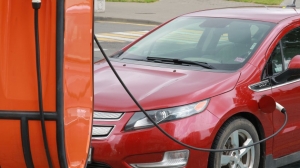Number of electric vehicles expected to rise in Belarus

MINSK, 24 March (BelTA) – All prerequisites are in place to expect electric transport to continue developing in Belarus. Experts stated their opinion about the matter during an online meeting hosted by a nuclear energy information center and organized by the Russian state nuclear industry corporation Rosatom, the corporation's press service told BelTA.
According to Rosatom's press service, the number of electric vehicles used for personal transportation and as part of the mass transit system has been rising in Belarus for the last few years. The growth is attributed to the higher environmental standards of electric vehicles in comparison with conventional ones. Mass use of electric vehicles can only benefit Minsk and other large cities. Due to the commissioning of the Belarusian nuclear power plant the country has a steady source of electricity at predictable prices. It will stimulate the development of electric transport as well.
Participants of the online meeting noted that electric transport is becoming one of the most promising spheres for development in Belarus. According to multiple experts, most of the public transport vehicles in Belarusian cities and towns will be electric in 2025-2030. Electric cars and other kinds of electric vehicles in urban areas will be able to consume about 2.3 billion kWh of electricity or up to 12.5% of the Belarusian nuclear power plant's output. On the whole, the level of affordable electricity will rise from 38 billion kWh now to 42 billion kWh by 2030. Belarusian scientists are busy designing their own lineups of electric cars, electric trucks and buses for urban areas. Belarusian electric buses are going through trials not only in Belarus but abroad as well.
Over 2,500 electric cars are registered in Belarus at present. Their number continues growing fast. According to some projections, it will be close to about 435,000 or about 14% of the nation's automobile fleet by 2030, said Artur Tumanov, a representative of the company that distributes a well-known electric car brand in Belarus.
Electric vehicles are not limited to electric public transport or cars. They also include electric scooters, electric bikes and unicycles. Their number continues growing as technologies develop and access to cheap electricity gets better. According to Vadim Osipchik, director of a scooter and bicycle sharing company, individual electric vehicles are at the height of their development. According to the Minsk cycling community, the number of electric transport users grows. Their share reached 15% in 2020.
“An electric bicycle or a scooter has become a conventional means of transportation,” Vadim Osipchik noted. “As urban infrastructure develops, people can freely reach any part of the city in comfort and without physical exertion thanks to electric motors. And of course the use of electric vehicles reduces harmful emissions into the atmosphere.”
During the online meeting Minsk residents also shared their personal experience of using electric transport. Sergei Ulasik, head of the foreign economic cooperation office of the national energy company Belenergo, mentioned the convenience of using unicycles. He had had one for more than a year already.













